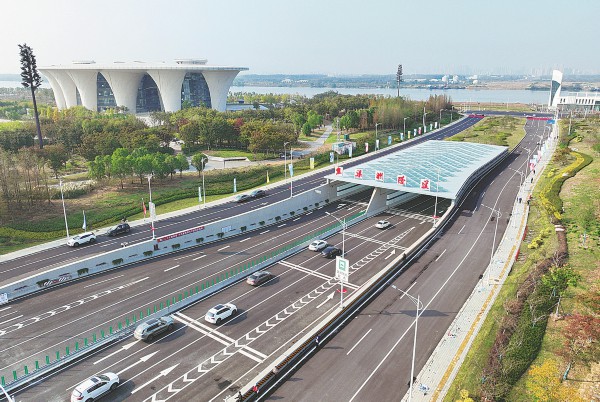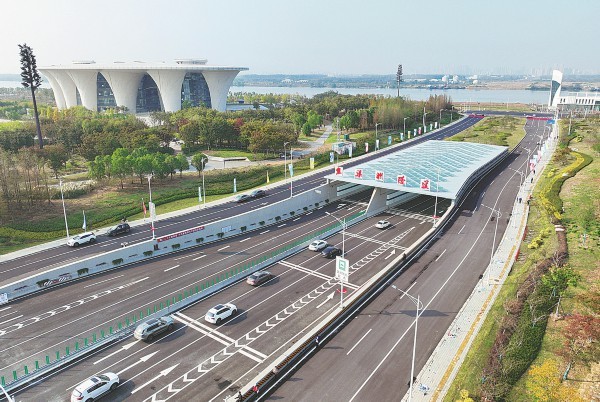
The Yuliangzhou Tunnel in Xiangyang, Hubei province, opens to traffic on Monday. It is the first highway tunnel under the Hanshui River, a major tributary of the Yangtze River. [Photo by XIE YONG/FOR CHINA DAILY]
China has increased the construction of highway infrastructure in order to maintain and increase investment and stabilize the economy, according to the Ministry of Transport.
From January to September, construction began on 299 new expressway and national and provincial highway projects with a total length of 9,645 kilometers and 882 billion yuan ($121 billion) in investment, Gu Zhifeng, deputy chief of the highway bureau of the Ministry of Transport, said at a news conference on Monday.
Among the projects, 34 of them stretching 2,132 km were started in September, and account for 43.7 percent of the total road infrastructure investment in the first three quarters of the year.
The projects include an underwater tunnel in Jiangsu province, as well as expressways in Sichuan and Yunnan provinces.
China built 9,756 km of expressways, and national and provincial highways from January to September, with a total investment of 557 billion yuan.
Last month, several highways and expressways — extending 1,441 km and accounting for 125 billion yuan in investment — opened to traffic.
"The ministry will continue to expand investment in road construction, with the key to improving the connectivity of the road network," Gu said.
He noted the implementation of major highway projects will facilitate economic stability, boost the construction of the modern transport system and support high-quality development.
"Transportation is the pulse of the economy and the nexus of civilization," said Hou Zhenxing, deputy director of the ministry's general planning department. He noted that the sector has created domestic demand and expanded investment.
Investment in transportation fixed assets saw a 6.3-percent growth year-on-year in the first three quarters, maintaining a high increase, to stabilize economic growth and create new space for investment, he added.
From January to August, investment in transportation-related fixed assets amounted to 2.34 trillion yuan, a year-on-year increase of 6.6 percent. Among them, 176 billion yuan was invested in building highways, a year-on-year increase of 9.5 percent.
To facilitate highway construction, the ministry has strengthened coordination to better understand the progression of key projects and help solve problems faced during construction, such as establishing working groups, carrying out on-site surveys, implementing online systems to track progress and setting up project ledgers, said Zhou Rongfeng, deputy head of the ministry's highway bureau.






